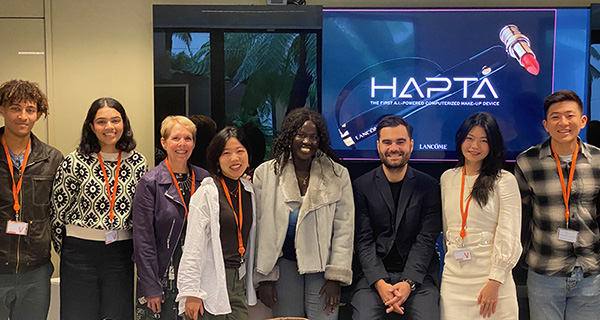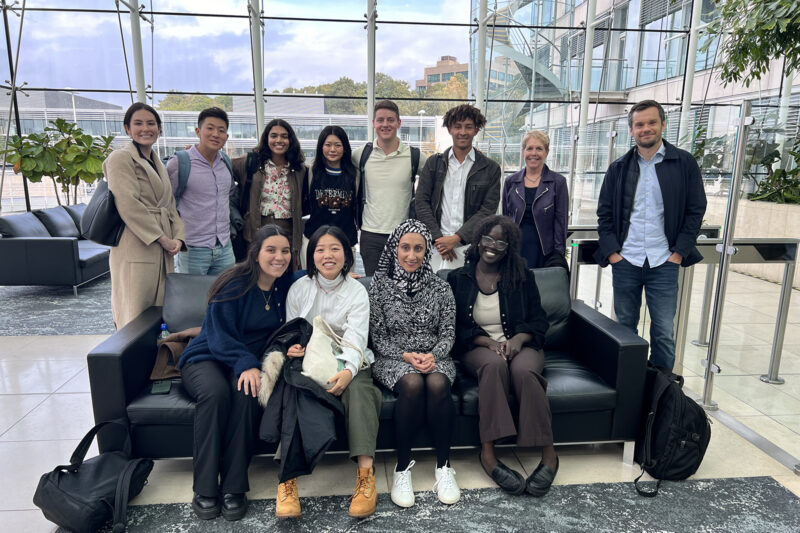The research focuses on equitable and authentic disability representation in the global business sector.
Last week, during the World Economic Forum’s annual meeting in Davos, Switzerland, a panel of senior corporate executives and advocates made the business case for more equitable and authentic disability representation, citing results from a 2023 white paper produced in collaboration with a group of undergraduate global affairs majors from the Yale Jackson School of Global Affairs.
The team of 10 students conducted the research as part of a Jackson School capstone course in which students complete a public policy project on behalf of a real client, such as a government agency, nonprofit, nongovernmental organization, or a private sector entity. The client in this case was The Valuable 500, a global network of private sector CEOs and their companies — from Apple and Microsoft to Sony and Unilever — who have committed to ending disability exclusion worldwide.
The Yale students’ research focused on the Valuable 500’s effort to ensure that disabled people are fairly and authentically represented in branding, media, and consumer products. As part of the project, they analyzed data gathered in a survey of 1,000 disabled individuals across 15 countries and six continents, which was fielded by market research firm Open Inclusion.
The Yale team also took the lead in developing case studies of select companies within the Valuable 500 network, examining innovations, best practices, and challenges associated with inclusive representation. Throughout the fall, students engaged with leaders from major consumer brands, including Jaguar Land Rover, L’Oréal, Lancôme, Proctor & Gamble, Sony, and Zalando; the work culminated in an intensive field study in London and Paris.
Case study findings touched on a range of ways in which companies are trying to better serve their diverse consumer base. In Paris, for example, leaders from the innovation team at beauty giant Lancôme demonstrated and discussed emerging technologies in the industry, including HAPTA, a device that stabilizes hand tremors and assists those with limited mobility in applying makeup. Accessibility leaders at Procter & Gamble talked with students about planned changes to shampoo & conditioner bottles that will allow people with visual impairment to distinguish between the two products more easily through a system of raised icons. Executives at online clothing retailer Zalando shared insights on the opportunities and challenges of selling adaptive clothing lines, which offer disabled people better fit and more stylish options.

Yale College senior Faith Evanson, who took part in the course (“Dress, Dignity, and Disability: Fashion as a Driver of Global Equity), says she chose this capstone topic not only because it aligned with her personal interest in fashion, but also for the chance “to make real changes to what companies are doing,” she said.
During the company visits, students were able to ask questions and press company leaders on how they would turn ideas into concrete actions. It was a unique opportunity to make an impact and to put their global affairs skills and knowledge to good use, according to Mary Davis, the Jackson School instructor who oversaw the course.
“The students made a significant contribution to the important work of disability inclusivity,” said Davis. “The global community of disabled people deserves equitable treatment. Beyond the moral and ethical imperative of this lies a business imperative and a consumer base of some $13 trillion. The Yale team really advanced the work,” she said.
While the capstone course was initially focused on the intersection of disability and fashion — with an aim of exploring how fashion retailers could better serve the 1.3-billion-person disabled community across the globe — the scope of the students’ final research report was far broader.
For corporate leaders, in the fashion world and well beyond, the message was simple: representation matters, and good design helps everyone — not to mention the enormous spending power of this underserved consumer group.
While the Yale students completed their work in the fall, the impact of their work will live on. Valuable 500 leaders will reconvene at a 2025 summit in Tokyo to assess their company’s progress on the goals outlined in the report.
Evanson says the lessons learned in the class will stay with her, particularly an eye-opening experience at the end of the field study trip in Paris. She and her classmates were given the choice of a restaurant for a final meal to cap off the trip and celebrate their accomplishments. Rather than opting for a trendy Instagram-worthy location, the students unanimously voted for Dans le Noir, which invites diners to eat in total darkness, being served by waiters with visual impairments.
“It was a chance to immerse ourselves in our research,” Evanson explained. And, without the benefit of sight, “we were more focused on listening to each other.”
- Read the final research report
- Learn more about the senior capstone course
